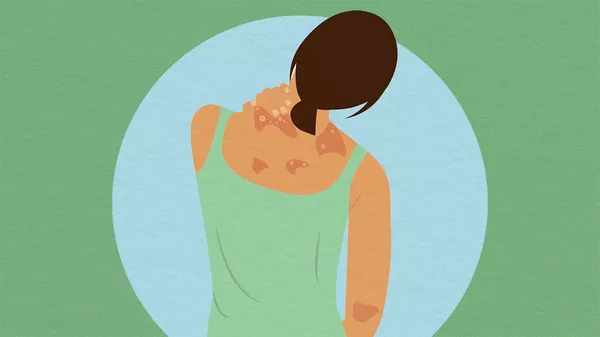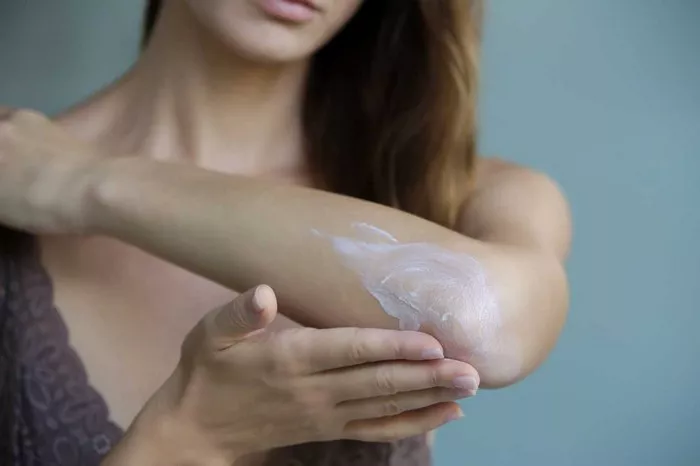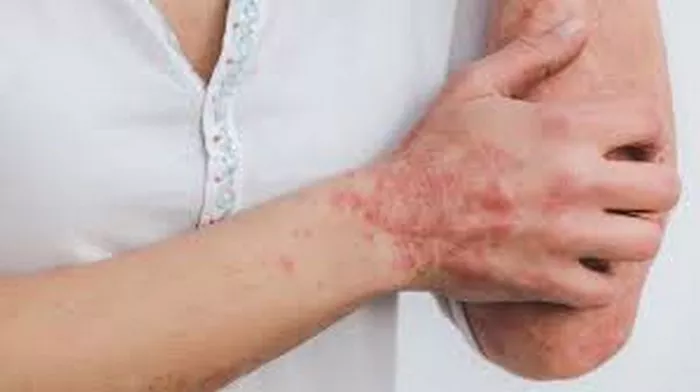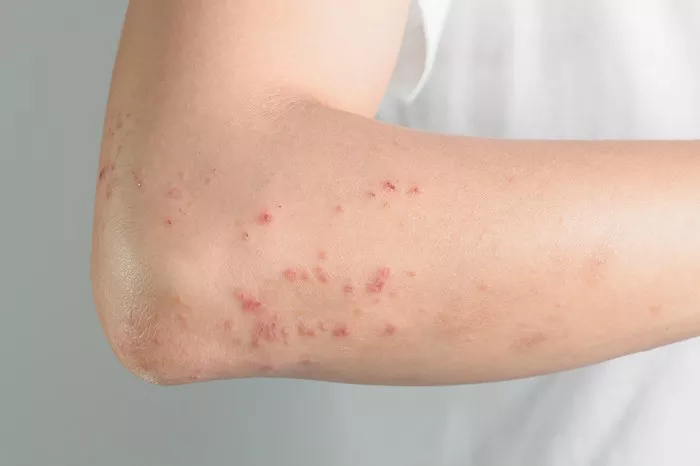Psoriasis is a chronic skin condition characterized by the rapid growth of skin cells, leading to thick, red, scaly patches. While it can affect any part of the body, psoriasis on the eyelids presents unique challenges due to the delicate nature of the skin in this area and its proximity to the eyes. Understanding the causes of psoriasis on the eyelids involves exploring a combination of genetic, immunological, and environmental factors. This article delves into these causes to provide a comprehensive understanding of this condition.
Genetic Predisposition
Genetics play a significant role in the development of psoriasis, including on the eyelids. Research indicates that psoriasis is a polygenic disorder, meaning multiple genes contribute to its onset. Several genes have been identified as being associated with psoriasis, with the PSORS1 gene on chromosome 6 being one of the most significant.
Family History
A strong family history of psoriasis increases the likelihood of developing the condition. Studies suggest that if one parent has psoriasis, the risk for the child ranges from 10% to 25%. This risk increases significantly if both parents are affected. The hereditary nature of psoriasis implies that genetic predisposition is a critical factor in its occurrence, including on sensitive areas like the eyelids.
Genetic Mutations
Specific genetic mutations can influence the immune system’s function, leading to an abnormal response that triggers psoriasis. Mutations in genes responsible for regulating the skin’s barrier function and immune response, such as the CARD14 gene, have been implicated in psoriasis development. These mutations can cause an exaggerated immune response, leading to the rapid turnover of skin cells that characterizes psoriasis.
Immune System Dysfunction
Psoriasis is primarily an autoimmune disease, meaning the body’s immune system mistakenly attacks healthy skin cells. This immune system dysfunction is central to understanding why psoriasis occurs, including on the eyelids.
T-Cell Activation
T-cells, a type of white blood cell, play a crucial role in the body’s immune response. In psoriasis, T-cells are mistakenly activated, triggering inflammation and rapid skin cell production. This process involves several steps:
- Triggering Factors: Various factors, such as infections, skin injuries, or stress, can activate T-cells in individuals predisposed to psoriasis.
- Cytokine Release: Activated T-cells release cytokines, which are proteins that regulate immune responses. In psoriasis, an overproduction of cytokines like TNF-alpha, interleukin-17 (IL-17), and interleukin-23 (IL-23) occurs, leading to inflammation and rapid skin cell growth.
- Inflammatory Response: The cytokine release causes an inflammatory response in the skin, resulting in the characteristic redness, swelling, and scaling of psoriatic lesions.
Autoimmune Reaction
In psoriasis, the immune system’s attack on healthy skin cells is a hallmark of the condition. This autoimmune reaction is particularly problematic on the eyelids, where the skin is thin and sensitive. The inflammation and increased cell turnover result in the formation of psoriatic plaques, which can be painful and disruptive.
Environmental Triggers
Environmental factors can trigger or exacerbate psoriasis, including on the eyelids. While these triggers vary from person to person, understanding common environmental factors can help manage the condition.
Stress
Stress is a well-known trigger for psoriasis flare-ups. The connection between stress and psoriasis is due to the release of stress hormones, such as cortisol, which can disrupt the immune system and exacerbate inflammation. Chronic stress can lead to more frequent and severe flare-ups, including in sensitive areas like the eyelids.
Infections
Certain infections, particularly streptococcal infections, have been linked to the onset and worsening of psoriasis. The immune response to these infections can trigger or worsen psoriatic symptoms. For instance, a strep throat infection can precede the development of guttate psoriasis, which can then spread to areas like the eyelids.
Skin Injuries
The Koebner phenomenon, also known as the isomorphic response, describes the appearance of psoriatic lesions on previously unaffected skin following an injury. Common injuries that can lead to this phenomenon include cuts, scrapes, or even surgical wounds. On the eyelids, even minor trauma, such as rubbing the eyes excessively or applying makeup, can trigger the formation of psoriatic plaques.
Weather Conditions
Weather can influence psoriasis symptoms. Cold, dry weather often exacerbates the condition by drying out the skin and triggering flare-ups. Conversely, exposure to sunlight and warmer weather can have a therapeutic effect on psoriasis for some individuals. However, excessive sun exposure can also lead to sunburn, which may trigger the Koebner phenomenon and worsen psoriasis on the eyelids.
SEE ALSO: Psoriasis Vulgaris vs. Plaque Psoriasis: What are the Differences
Lifestyle Factors
Certain lifestyle choices and habits can influence the development and severity of psoriasis, including on the eyelids.
Diet and Nutrition
While diet alone does not cause psoriasis, certain dietary choices can impact inflammation and overall skin health. Diets high in inflammatory foods, such as processed foods, red meats, and sugars, can exacerbate psoriatic symptoms. Conversely, diets rich in anti-inflammatory foods, such as fruits, vegetables, and omega-3 fatty acids, may help reduce inflammation and improve skin health.
Alcohol and Smoking
Both alcohol consumption and smoking have been linked to increased severity and frequency of psoriasis flare-ups. Smoking, in particular, has been shown to influence the development and exacerbation of psoriasis due to its effects on the immune system and skin health. Alcohol can disrupt the immune system and interfere with medications used to treat psoriasis, leading to more severe symptoms.
Obesity
Obesity is a known risk factor for psoriasis. Excess body weight can contribute to inflammation and increase the risk of metabolic syndrome, which is associated with more severe psoriasis. The inflammatory cytokines produced by adipose (fat) tissue can exacerbate psoriatic symptoms, making weight management an important aspect of psoriasis care.
Hormonal Changes
Hormonal fluctuations can influence the severity and frequency of psoriasis flare-ups, including on the eyelids. Hormonal changes during puberty, pregnancy, menopause, and the menstrual cycle can all impact psoriasis.
Puberty
During puberty, hormonal changes can trigger the onset or worsening of psoriasis. Increased levels of androgens and other hormones can influence the immune system and skin cell production, leading to the development of psoriatic lesions.
Pregnancy
Pregnancy can have varying effects on psoriasis. Some women experience an improvement in their symptoms during pregnancy, likely due to increased levels of certain hormones like estrogen and progesterone. However, others may experience a worsening of symptoms, particularly postpartum, when hormone levels fluctuate significantly.
Menopause
Menopause is associated with a decline in estrogen levels, which can impact skin health and potentially exacerbate psoriasis. The reduction in estrogen can lead to drier skin and increased inflammation, contributing to more frequent and severe flare-ups.
Medication and Treatment Triggers
Certain medications and treatments can trigger or worsen psoriasis. Understanding these triggers is crucial for managing the condition effectively.
Medications
Several medications have been identified as potential triggers for psoriasis flare-ups. These include:
- Beta-Blockers: Used to treat high blood pressure and heart conditions, beta-blockers can trigger or worsen psoriasis in some individuals.
- Lithium: Commonly used to treat bipolar disorder, lithium has been associated with psoriasis flare-ups.
- Antimalarials: Medications used to prevent or treat malaria can exacerbate psoriasis symptoms.
- NSAIDs: Nonsteroidal anti-inflammatory drugs, such as ibuprofen and aspirin, can trigger psoriasis in some people.
Withdrawal of Systemic or Topical Steroids
Suddenly stopping the use of systemic or topical steroids can lead to a rebound effect, causing a severe flare-up of psoriasis. This is particularly concerning for areas like the eyelids, where the skin is thin and sensitive.
Phototherapy
While phototherapy (exposure to ultraviolet light) is a common and effective treatment for psoriasis, improper use or overexposure can lead to skin damage and potentially trigger the Koebner phenomenon, worsening psoriasis symptoms.
Conclusion
Psoriasis on the eyelids is a complex condition influenced by a combination of genetic, immunological, environmental, lifestyle, hormonal, and treatment-related factors. Understanding these causes can help individuals and healthcare providers develop more effective management strategies tailored to the sensitive nature of the eyelid skin.
Managing psoriasis on the eyelids requires a multifaceted approach, including avoiding known triggers, adopting a healthy lifestyle, and using appropriate treatments under the guidance of a healthcare professional. By addressing the underlying causes and triggers, individuals with psoriasis on the eyelids can achieve better control over their symptoms and improve their quality of life.
Related Topics:

























